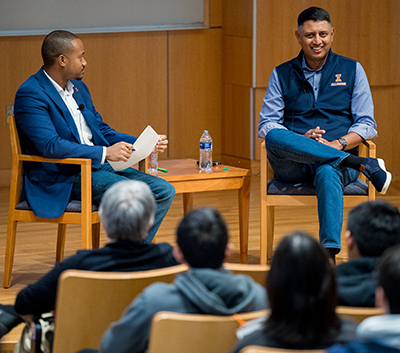Jun 12, 2025
Sandeep Pisipati inspires students in Gies Conversations series

Sandeep Pisipati (FIN ’04), President of Last Mile Operations at RXO, returned to his alma mater to share his insights and experiences with students at Gies College of Business during the Gies Conversations series on April 9. In a dialogue moderated by Nehemiah Scott, Associate Dean of Undergraduate Programs and Teaching Associate Professor of Business Administration, Pisipati offered students a candid look at the personal and professional lessons that have shaped his global business journey.
Discovering Purpose Through Experience
A key theme of the conversation was the importance of finding purpose—a central tenet of the Gies Business mission. Reflecting on his early career, Pisipati admitted he didn’t always have clarity about his direction.
“When I was your age, I don't think I even had a purpose,” he said. “I think the one thing that I knew is I needed to put myself in a position where I could have a purpose. Make sure that you have all the ducks in a row so that you have a foundation so that you can start really helping others. You’ve got to put yourself in position, and that takes time.”
He emphasized that purpose is not fixed but evolves with time and growth.
“The purpose right now is changing for me by the quarter, by the year.” Pisipati explained. “I think in my position my purpose includes finding somebody that can do my job better than I can. I have an obligation to the shareholders and to my company so that if I get hit by a bus tomorrow, it is an ongoing process. So that's why we need purpose, to find and develop something that you do better than for the short term.”
Navigating COVID and Industry Disruption
Pisipati shared firsthand accounts of how the COVID-19 pandemic reshaped the logistics and transportation industry. As CFO of a major global supply chain firm at the time, he described the upheaval when traditional shipping cycles were upended.
“In March, everything shut down,” he said. “We were kind of expecting a long downturn. Then as it progressed, orders were coming back faster than we expected. Ultimately, what happened was a U-shaped recovery. It hit us hard. If you remember those days, five years ago, a two-by-four cost around $50 and you had to wait three weeks to get it. So simple things, supply chains were clogged up. We were right in the heart of that situation, with way more demand than we had supply.”
He also described the lasting shift in consumer behavior – from goods to services – and the current state of the logistics sector.
“For the last three years, we've been in a transportation recession,” he said. “There are more planes, trucks, ships than there is actual product, so more capacity than there is product – that's all retraction components.”
Real-World Career Advice
When asked about navigating careers in an uncertain world, Pisipati encouraged students to embrace ambiguity.
“Be okay with uncertainty,” Pisipati said. “You don't know enough to make all the right decisions right now. And the only way you can do that is to make mistakes. It's 100% okay. That's really it. Associating with the right teams, the right company, right jobs, even the right industries – to make a few mistakes, it’s perfectly fine.”
He also underscored the importance of long-term financial planning:
“Put away a little bit at a very young age. It's amazing the difference when you start at 22 and you put away a little bit every month, versus starting at even 30. That'll make a few million for your net worth over a 30-year period. So, be smart.”
The Power of Preparation
In response to a student question about preparing for the future, Pisipati stressed the importance of being ready—especially when others are relying on your judgment.
“Preparation builds credibility,” he said. “Imagine being in a meeting with your CEO, making a recommendation, and then coming back later to say it was wrong. That instantly erodes trust.”
However, he cautioned against rigid planning.
“I used to be very Type A. I had timelines—be here by 25, there by 30. But life rarely follows a script. What truly matters is aligning yourself with the right company, the right values, and the right people for the long haul.”
